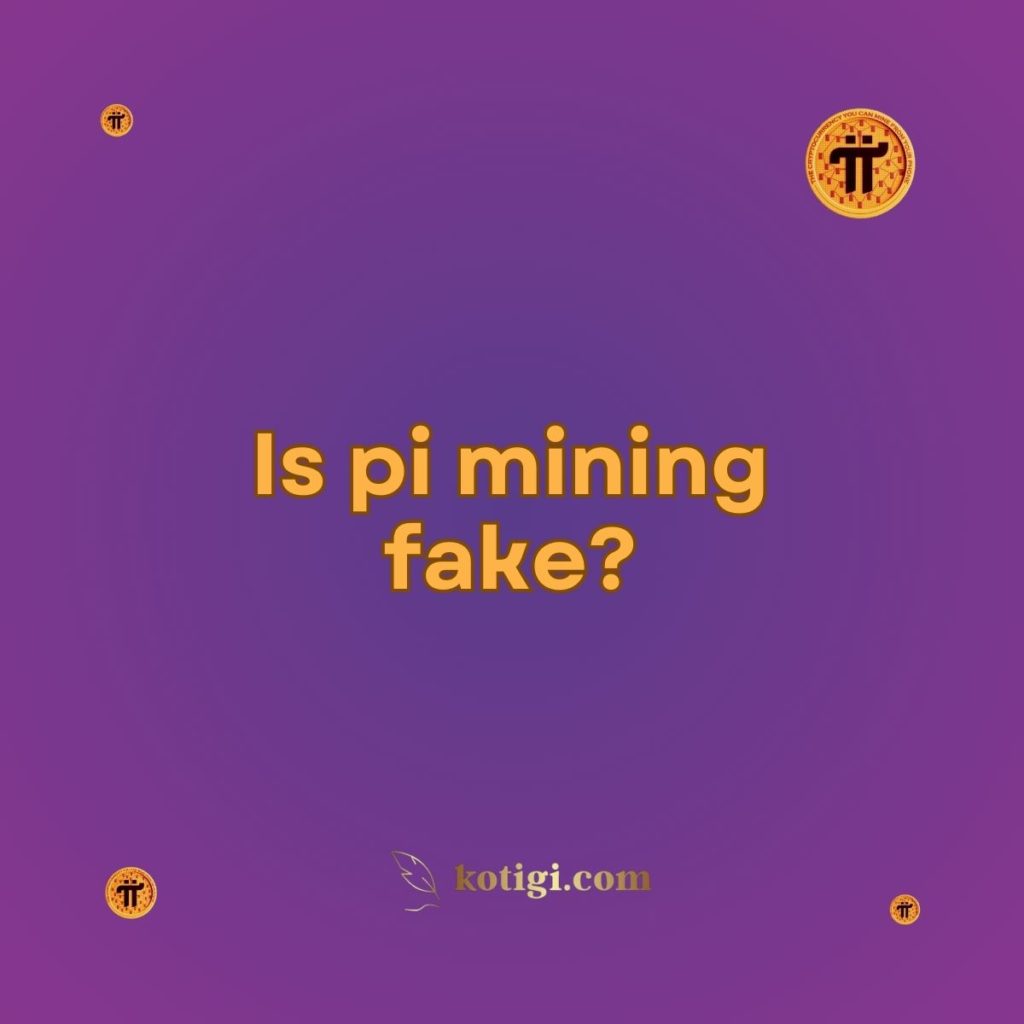
With the rapid growth of cryptocurrency, many new platforms have emerged, each claiming to offer revolutionary ways of earning digital assets. One of the most talked-about networks is the Pi Network, which promises to democratize cryptocurrency mining, allowing users to mine Pi directly from their smartphones. However, skepticism around Pi mining persists, and many users ask: Is Pi mining fake?
In this article, we’ll explore Pi mining’s legitimacy, how it works, and whether you should be concerned about its authenticity.
What is Pi Mining?
To understand whether Pi mining is fake, we must first break down how it works and what sets it apart from traditional cryptocurrency mining.
1. Mining on Mobile Devices
Unlike Bitcoin, which relies on high-powered computers to mine new coins, Pi Network allows users to mine using their smartphones. By simply pressing a button each day on the app, users participate in a consensus algorithm that secures the network and rewards them with Pi tokens.
2. No Need for Power-Intensive Equipment
Traditional mining requires solving complex cryptographic problems that consume vast amounts of energy. Pi mining, however, uses the Stellar Consensus Protocol (SCP), which doesn’t require massive computational power or electricity. As a result, users can “mine” without draining their phone’s battery or resources.
3. Pi’s Current Stage
Pi is currently in its Testnet phase, meaning the network is still being tested before its official launch on the Mainnet. During this phase, Pi cannot be traded or converted into other cryptocurrencies or fiat currency, as it hasn’t been listed on exchanges yet.
Is Pi Mining a Scam?
The biggest concern for many users is whether Pi mining is a scam or a genuine opportunity. Let’s look at some key factors that suggest Pi mining is legitimate.
1. Reputable Team Behind Pi Network
The Pi Network was developed by a team of Stanford University graduates, including Dr. Nicolas Kokkalis, Dr. Chengdiao Fan, and Dr. Vincent McPhillip. Their academic backgrounds and professional experience lend credibility to the project. This strong leadership is one of the main reasons many believe Pi mining is not a scam.
2. No Upfront Financial Investment
One of the hallmarks of cryptocurrency scams is requiring upfront payment or investments before users can participate. With Pi, users are not required to invest any money. Instead, they mine Pi simply by logging into the app daily and pressing a button. This no-cost approach helps ease fears that Pi is a financial scam.
3. Focus on Ecosystem Development
Pi Network is currently focused on building a sustainable ecosystem. The team has been transparent about the phased launch process, including the current Testnet phase. Pi is not listed on exchanges yet because the team is still refining the technology and securing the network. This measured approach indicates that Pi is more focused on long-term success rather than a quick cash grab.
Why Do Some People Think Pi Mining is Fake?
Despite these positive indicators, there are several reasons why some users remain skeptical of Pi mining.
1. No Monetary Value Yet
Since Pi cannot currently be traded or converted into money, some users feel it is pointless or “fake.” The fact that Pi has no value right now raises concerns, especially among those who are unfamiliar with the development timeline of blockchain projects. It’s important to note that many legitimate cryptocurrencies, including Bitcoin, had no monetary value when they were first created.
2. Lack of Transparency About Future Value
Another common concern is the lack of certainty about Pi’s future value. Because Pi has not yet been listed on cryptocurrency exchanges, no one knows what its market value will be when it eventually launches. Some users worry that even after Pi is listed, it may not hold significant value, making their efforts in mining feel wasted.
3. The Nature of Crypto Speculation
Cryptocurrency projects are often subject to speculation, and Pi is no exception. Since Pi Network has a different approach from traditional cryptocurrencies, some are quick to dismiss it as “fake” because it doesn’t follow the typical models of mining and blockchain transactions. However, innovation in crypto often brings about skepticism before acceptance.
Is Pi Mining Safe?
Beyond questions of legitimacy, many users also wonder whether Pi mining is safe. Since mining takes place on a smartphone app, the fear of data misuse or privacy invasion is valid. Here are some considerations for Pi mining’s safety:
1. Data Privacy Concerns
Pi Network requires users to provide basic personal information such as their name and phone number for verification purposes. While this level of data collection is similar to many other apps, some users worry about how their data will be used. However, Pi Network claims that they do not sell or misuse personal data.
2. App Permissions
Pi’s mobile app requires minimal permissions to operate. It does not demand access to sensitive information like messages, phone calls, or location services. Additionally, mining Pi doesn’t consume large amounts of data, making it relatively safe in terms of user privacy.
3. No Hardware Risk
Because Pi doesn’t require energy-intensive mining like Bitcoin, there is no risk of damaging your phone or running up your electricity bill. The app runs in the background and doesn’t require continuous activity, making it a low-risk endeavor for users.
The Future of Pi Mining
The question of whether Pi mining is fake will likely be answered when Pi enters its Mainnet phase and is listed on cryptocurrency exchanges. While there are no guarantees about Pi’s future value, there are several indicators that Pi mining is a genuine project with real potential.
1. Mainnet Launch
Pi Network’s Mainnet launch will be the most critical milestone. Once the Mainnet goes live, Pi tokens mined by users during the Testnet phase will be converted into the official Pi cryptocurrency. At that point, users will be able to transfer, trade, and potentially sell their Pi holdings.
2. Listing on Exchanges
Pi’s value will depend largely on its listing on major cryptocurrency exchanges. Once Pi is listed, users will be able to sell their Pi for other digital currencies or even fiat money. Until then, Pi remains a speculative project without immediate financial returns.
3. Building the Ecosystem
In addition to trading Pi, the network aims to develop its own ecosystem where users can spend Pi on goods and services. If successful, Pi’s utility as a currency could increase, further legitimizing the project and giving users additional ways to generate value from their mined Pi.
Conclusion
So, is Pi mining fake? Based on the information available today, Pi mining does not appear to be fake. With a reputable team behind the project, no upfront costs, and a clear roadmap toward launching a Mainnet, Pi mining is more likely a long-term investment than a scam. However, it’s important to keep in mind that Pi currently holds no monetary value, and the project’s success will depend on its future development and acceptance in the cryptocurrency market.
For users who are concerned about scams or fake projects, Pi mining’s lack of immediate financial return might feel disappointing. However, as with many blockchain projects, patience is key. Only time will tell whether Pi can deliver on its promises, but for now, Pi mining appears to be a legitimate opportunity for those willing to wait.
Is pi mining fake?
No, Pi mining is not fake. Pi Network is a legitimate project developed by a reputable team, and while Pi has no monetary value yet, it could become valuable once the Mainnet launches and Pi is listed on cryptocurrency exchanges.
Key Takeaways
- Future Potential: Pi’s future value will depend on its Mainnet launch, exchange listings, and adoption in the broader cryptocurrency ecosystem.
- Legitimate Project: Pi mining is not fake; it is a legitimate project with a team of Stanford graduates working behind it.
- No Monetary Value Yet: Currently, Pi has no monetary value, but that could change after the Mainnet launch.
- No Upfront Costs: Pi mining doesn’t require financial investment, reducing the risk of it being a scam.
- Privacy and Security: The Pi app requires minimal permissions and doesn’t pose significant privacy or hardware risks.





